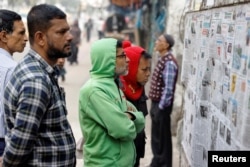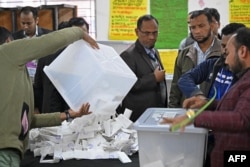Bangladesh’s ruling Awami League party, led by Sheikh Hasina, won a fourth-straight general election on January 7.
Critics called the election a one-sided sham, marred by a crackdown on the opposition and allegations of voter fraud.
The Awami League has countered that the election was aboveboard and accused the main opposition, Bangladesh Nationalist Party or BNP, which boycotted the poll, of being “an anti-democratic and terrorist force.”
Hasina argued the BNP’s boycott of the poll had no bearing on its legitimacy.
“We showed that elections can be fair and unbiased,” the Awami League posted to X on January 8.
That is likely false.
Through the ruling party’s growing authoritarianism, a crackdown on the political opposition and Awami League supporters’ use of violence and intimidation to prevent journalists from reporting on electoral fraud, the evidence suggests the January 7 election was not free and fair.
The roots of the current conflict can be traced back in part to 2011, when the Awami League secured a constitutional amendment abolishing the caretaker government system. The caretaker system had required the elected government to step aside and allow a neutral administration to take the reins in the lead-up to elections.
That led the BNP to boycott elections in 2014. The BNP did participate in 2018 elections, which were marred by credible allegations of vote rigging and repression of the political opposition.
After unsuccessfully petitioning for the poll this January 7 to be run by a caretaker government, the BNP sat out what it called a “stage-managed election.”
Last October 28, the BNP and its former ally, the Islamist Bangladesh Jamaat-e-Islami party, which was banned from participating in elections in 2013, joined again to stage a massive rally in the capital, Dhaka. Protesters reiterated calls for Hasina to step down so that a caretaker government could manage the elections.
A senior BNP official said police arrested at least 1,500 people, including several senior BNP officials, ahead of that rally.
Violence erupted at the demonstration, which police forcibly dispersed.
The U.K.’s Guardian newspaper reported that activists from the Awami League, “accompanied by police,” attacked protesters with sticks, iron rods, machetes and other weapons.
At least 16 people were killed, including two police officers.
Over a two-week span, authorities arrested some 10,000 BNP activists and sent them to prisons to join thousands of other political prisoners. Police also raided the homes of BNP leaders.
Days before the January 7 election, arson attacks on polling places and an arson attack on a passenger train bound for Dhaka that killed four heightened tensions.
The Awami League accused the BNP and other opponents of unleashing this "reign of terror on innocent people.” The BNP countered that the violence was being used to discredit their “peaceful and nonviolent movement."
On January 8, United Nations Human Rights Chief Volker Turk said roughly 25,000 opposition supporters, including key party leaders, had been arrested since October 28. At least 10 opposition supporters had reportedly died — or been killed — in custody over the preceding two months.
Last November, Ali Riaz, professor of political science at Illinois State University, told the Voice of America that the mass arrests of BNP leaders and activists and the “unprecedented speed” of their conviction, even in unfounded cases, showed that the “ruling party wants to hold an engineered election.”
Others concurred with that assessment.
“The government is claiming to commit to free and fair elections with diplomatic partners while the state authorities are simultaneously filling prisons with the ruling Awami League’s political opponents,” Julia Bleckner, a senior Asia researcher at New York-based Human Rights Watch, or HRW, said in November.
Bleckner told VOA in November that HRW had “documented cases of enforced disappearance, torture, extrajudicial killings and mass arbitrary arrest of the political opposition.”
"The ongoing systematic crackdown on opposition members, critics and human rights activists by Bangladesh security forces makes a free and fair election impossible,” she said.
Other analysts and opposition leaders told VOA the elections would not be fair.
According to unofficial results, the Awami League won 222 seats out of 298.
Only one other party, the center-right, opposition-aligned Jatiya Party, successfully fielded more than one candidate, capturing 11 seats.
The BNP also alleges that most of the independent candidates, who collectively picked up 62 seats, were “dummies” — Awami League members who ran as independents to give the election the appearance of legitimacy.
VOA’s Bangla Service reported that 94% of the parliamentary seats will be filled by lawmakers who are members of the ruling party, raising the specter of one-party rule.
There have also been reports of ballot stuffing and other forms of voter fraud.
Eleven Jatiya Party candidates withdrew from the race, alleging widespread irregularities, including ballot stuffing, Bangladesh’s Daily Star newspaper reported.
Reporters Without Borders, or RSF, documented at least 12 cases of journalists being attacked, barred or expelled while attempting to report on allegations of voter fraud at polling stations, largely by Awami League supporters.
RSF said that the websites of opposition-aligned media were made inaccessible on the eve of the election, and the government refused entry visas to many journalists from leading international news outlets.
Turnout in the January 7 poll was around 40% — that is less than half the turnout percentage for the 2018 election. The opposition alleges the turnout figure in the election was inflated.
Still, some international observers invited by Bangladesh's Election Commission, including former U.S. Congressman Jim Bates, called the elections "free, fair and peaceful.”
The U.S. State Department does not share that view.
"The United States Government did not field an observation team for the 2024 Bangladesh Parliamentary elections. The individuals in question were acting as private citizens. ... Their comments do not represent the views of the U.S. government,” a State Department spokesperson told VOA.
The United States and the United Kingdom determined the elections were not credible.







